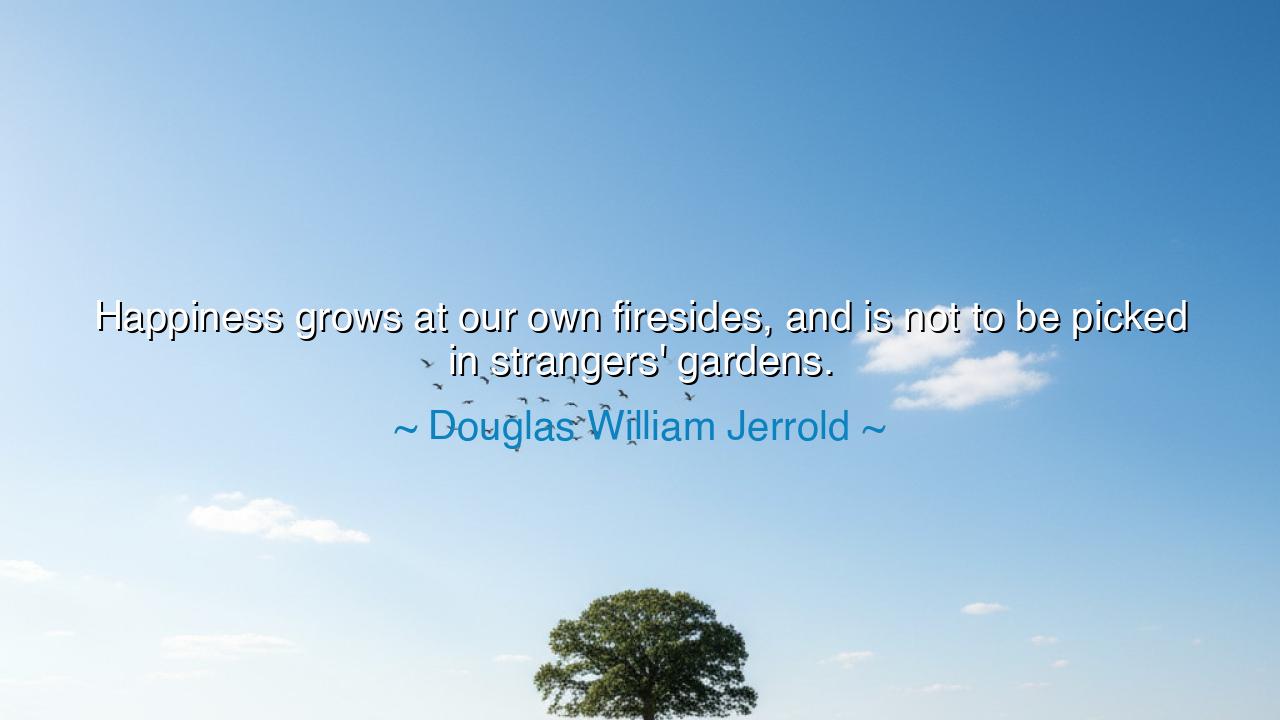
Happiness grows at our own firesides, and is not to be picked in






The English dramatist and essayist Douglas William Jerrold, a man of wit and tenderness, once spoke this enduring truth: “Happiness grows at our own firesides, and is not to be picked in strangers’ gardens.” In this simple yet profound saying, he reminds us that true happiness is not a treasure to be hunted in distant lands, nor a fruit that grows in another’s soil. It blooms quietly where we already stand—within our homes, our hearts, and our humble daily lives. Jerrold’s words echo like a gentle bell across the ages, calling us back from the restless chase for joy to the peace that waits beside our own hearths.
Jerrold lived in nineteenth-century England, an age when the world was changing swiftly. The Industrial Revolution had begun to stir people’s desires for more—more wealth, more adventure, more spectacle. Amid such rising ambition, he saw a great danger: that men and women, in their hunger for success, would forget the quiet blessings of home. He saw that they would travel far and wide seeking happiness, only to discover that it had been waiting all along by their own fireside, in the familiar faces of family, in the comfort of honest labor, in the stillness of contentment. Thus, his words were not a rebuke against the world’s beauty, but a reminder that joy does not lie in pursuit, but in presence.
To say that “happiness grows at our own firesides” is to proclaim that joy must be cultivated, not captured. It is like a plant that thrives only when tended with gratitude, love, and attention. Many look beyond their homes, beyond themselves, imagining that others—those in grander houses, or in distant lands—possess some secret bloom of joy. But the wise know that such envy leads only to weariness. Each man’s garden must be his own; each heart must till its own soil. For happiness does not belong to those who wander seeking it, but to those who nurture it in the small, steady acts of daily life: a shared meal, a word of kindness, the quiet companionship of those we love.
History gives us endless testimony to this truth. Consider Leo Tolstoy, the great Russian writer, who after years of fame and wealth found himself tormented by despair. He had sought happiness in art, in intellect, in prestige—but none could satisfy his spirit. Only when he turned back to simplicity—to the land, to family, to faith—did he rediscover peace. He realized, as Jerrold had written, that happiness does not live in “strangers’ gardens,” but in one’s own home, one’s own conscience. The lesson of his life was that what the world calls success often hides a hollow heart, while what seems humble may contain the seed of joy.
To envy others, to seek joy in imitation or in escape, is to abandon the garden of one’s own soul. The world dazzles us with false promises—riches, fame, pleasure, power—and yet these are but flowers that wither quickly. The fireside, by contrast, represents the enduring warmth of authenticity—the love that does not fade, the work that brings quiet pride, the peace that needs no applause. Jerrold’s wisdom teaches us to kindle that fire, to tend it with care, and to remember that even the smallest home can shine brighter than the grandest palace if it burns with love and gratitude.
To live by this truth requires practice and humility. Each day, pause and look around you: what blessings already rest within your reach? Do you greet your family with kindness? Do you take joy in your work, however simple it may be? Do you give thanks for the warmth of food, the comfort of rest, the beauty of the familiar? The man who cultivates these small joys is rich beyond measure, while the one who forever looks to “strangers’ gardens” will always feel poor, no matter how much he owns.
So, my children, remember Douglas William Jerrold’s teaching: do not chase happiness across the horizon—it cannot be caught, only grown. Build your joy at your own fireside, among those who know your name, in the soil of your daily life. Do not waste your days envying what others have, for envy is a frost that kills the blossoms of the soul. Instead, be a faithful gardener of your own heart—sow gratitude, water it with love, and let patience bring it to bloom.
For in the end, happiness is not a thing to be found but a warmth to be kindled. It is the fire that burns quietly within the home, the glow that spreads from one contented heart to another. And when you have learned this truth, you will no longer wander the world in search of joy—you will carry it with you, a steady flame, forever alight in the hearth of your soul.






AAdministratorAdministrator
Welcome, honored guests. Please leave a comment, we will respond soon